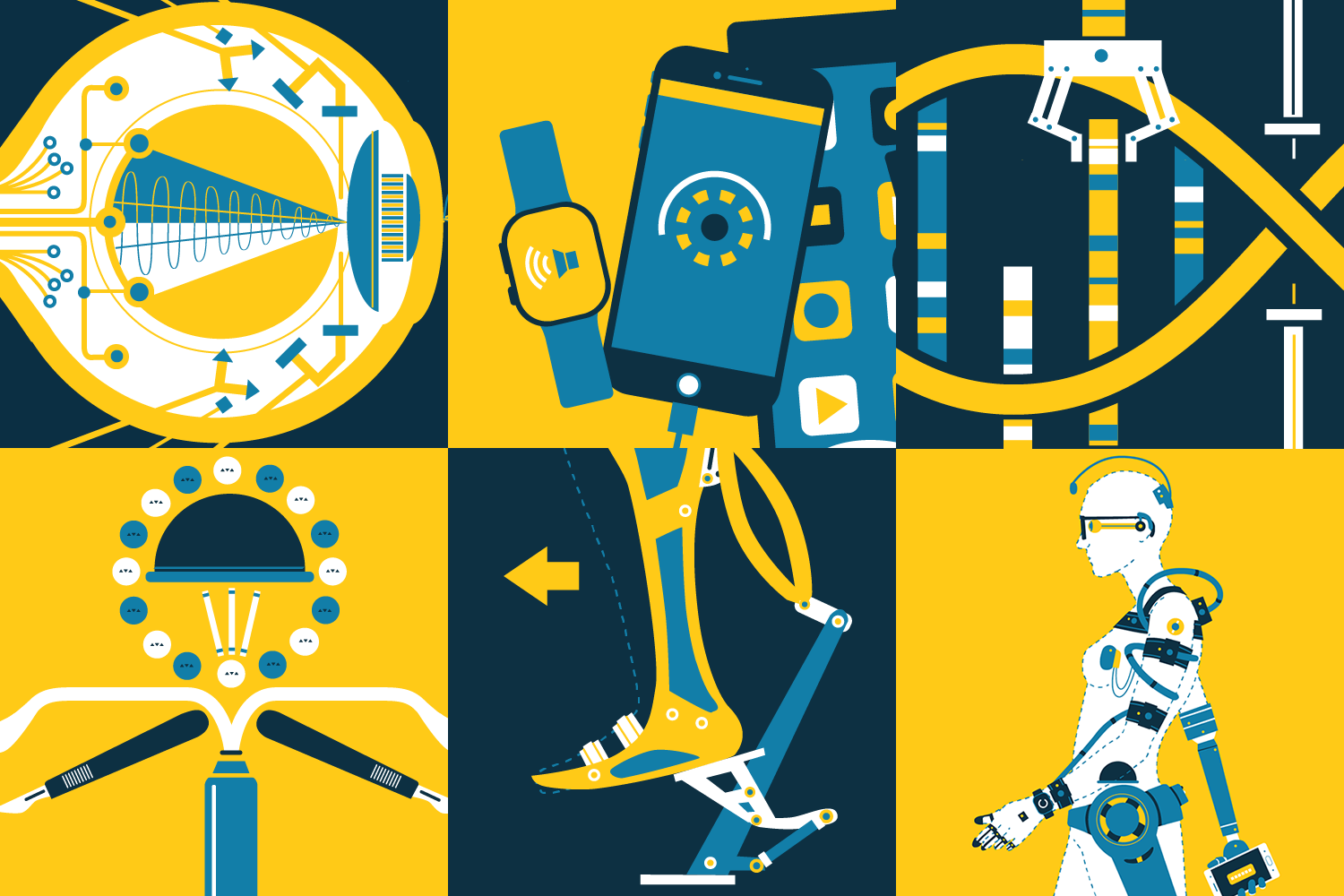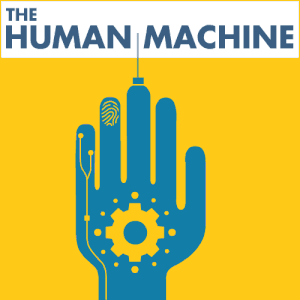

This is the final episode of our Human Machine series, exploring the increasingly blurry lines between humans and technology. The other episodes are available here:
- Ep. 1: “Introduction“
- Ep. 2: “The Real-Life Cyborgs of the DIY Augmentation Scene“
- Ep. 3: “Your Brain is Your Phone“
- Ep. 4: “The Future of Birth Control Means Facing Up To Its Sexist Past“
- Ep. 5: “Who Gets to Be Perfect?“
- Ep. 6: “Building a Faster, Stronger Human“
- Ep. 7: “The Human Machine of 2037“
“¦and this is episode 8, the series conclusion.
There have been a few key recurring questions in everything we’ve looked at over the last few months, from sense hacking to birth control, prosthetics to gene editing. What is the point of a future that’s not accessible to everyone? If we feel the technology we rely on is changing us, can we trust that change?
After all, the revolution of today is the mundane of tomorrow. Our successors will find the moral panics around smartphones as quaint as we now think of 20th century moral panics over television. That isn’t to deny that technology changes us–just that humanity is endlessly adaptable, and we can find ourselves within a new normal with startling rapidity.
We will always be living part-biological, part-technological lives, because that’s what humans do. We invent, we adapt, we manipulate and adjust–and we try and understand those processes, to welcome or to fear them.

General Background
- READ: A profile of technologist Manfred Clynes, who coined the word “cyborg” in 1960 with his colleague Nathan Kline [5-minute read]
- READ: “Cyborgs and Space,” the paper in the journal Astronautics where Clynes and Kline explored their concept of the cyborg. [10-minute read]
- READ: Hari Kunzru’s profile of Donna Haraway for Wired, feminist theorist and critic of the “nature”/”technology” binary [10-minute read]
- READ: Donna Haraway’s 1984 text “A Cyborg Manifesto“–still shaping debate on the topic to this day [30-minute read]
- READ: “50 Posts About Cyborgs,” collected by Tim Maly in 2010 on the 50th anniversary of the word [Many-minutes read]
- READ: “What’s a cyborg?“–Tim Maly’s introduction to the above project, and exploration of how the word has changed [6-minute read]
- LISTEN: To Kraftwerk’s “The Robots”:

Sense Hacking
- READ: Olivia Solon in the Guardian getting a payment chip implanted in her hand and becoming “the world’s lamest cyborg” [4-minute read]
- READ: Adi Robertson bemoaning that her cyborg implant, a magnet, was a body hack “for a future that never came” [5-minute read]
- READ: How Jamais Cascio found himself “an accidental cyborg” after getting his first hearing aid [4-minute read]
- READ: Stephen Becker’s analysis of “fake cyborgs,” people who care more about looking augmented than actually being so [5-minute read]
- READ: “I Am a Cyborg and I Want My Google Implant Already,” demands Arikia Millican in Wired [3-minute read]
- READ: “Bring on the BodyNET“–that is, an internet of augmented bodies–says mechanical engineer Bryant Chu in Nature [6-minute read]

Connected Brains
- READ: In the Guardian, Michael Lynch explaining “why our smartphones are extensions of ourselves” [4-minute read]
- READ: On the “extended mind thesis,” a philosophical explanation for why smartphones feel like a part of the body [3-minute read]
- READ: A profile of Tristan Harris, an ex-Googler who is now an evangelist for more ethical technology design [7-minute read]
- READ: Marshall McLuhan’s seminal 1964 text on new communicative technologies, “The Extensions of Man” [It’s a book]
- READ: “What Would McLuhan Say about the Smartphone?“–analyzing smartphones through a lens of Marshall McLuhan’s work [10-minute read]
- READ: One of many personal stories recently about how “getting rid of my smartphone revolutionized my life” [10-minute read]
- READ: “You Are Already Living Inside a Computer,” argues Ian Bogost, and you probably don’t even notice [8-minute read]
- READ: Matt Haig argues that social media is a force for malevolence, comparable to the tobacco industry [3-minute read]

Birth Control
- READ: Malcolm Gladwell on “John Rock’s Error,” about how the men who invented the pill misunderstood female reproduction [12-minute read]
- READ: A pamphlet from Planned Parenthood on the effects of the pill, stats about its use, and a whitewashed version of its history [10-minute read]
- READ: “The Dark History of Birth Control That You Haven’t Heard“–a corrective to the sanitized history above [6-minute read]
- READ: Rose Eveleth at Splinter rightly points out that “bodyhackers are all around you, they’re called women” [8-minute read]
- READ: Technologies like IUDs mean that “at least ten percent of women are cyborgs” [3-minute read]
- READ: Quinn Norton contemplates 50 years of both “cyborgs” and invasive birth control for women [6-minute read]
- READ: Sophie Cousins in Mosaic explores how birth control technologies make women’s bodies a battleground across the world [17-minute read]
- READ: Emily Anthes at Bloomberg explains why the potentially-lucrative male pill is still not here yet [10-minute read]

Gene Editing
- READ: Micheal Specter in The New Yorker details how researchers realized CRISPR allowed them to rewrite life [24-minute read]
- PLAY: The New York Times has a quiz that explains just what is, and isn’t, within the realm of possibility with gene editing [4-minute play]
- READ: As human embryo editing becomes a realistic possibility, scientists are more open about ethical concerns [5-minute read]
- READ: “The rise and fall and rise again of 23andme“, about the world’s largest private gene testing company [10-minute read]
- WATCH: Dystopian sci-fi thriller Gattaca, which imagines a world of eugenics and open genetic discrimination:

Exoskeletons & Prosthetics
- READ: “Can We Build an Iron Man Suit That Gives Soldiers a Robotic Boost?” in Science [12-minute read]
- READ: Emiko Jozuka’s report on robot exoskeletons coming to Japan’s airports (and for the country’s many retirees) [4-minute read]
- READ: Profile of Ekso Bionics, an exoskeleton company, which is struggling to convince people its products are useful [10-minute read]
- READ: “Robotics are Helping People Walk Again, But the Price Tag is Enormous” [7-minute read]
- READ: How an exoskeleton designed by the U.S. Navy could make regular people “20 times more productive” [4-minute read]
- READ: How the Cybathlon, an Olympics for advanced prostheses, shows the future of assistive technology [6-minute read]

Everything Else
- READ: Wired attempts to map out and quantify each of the many tech anxieties of our age [3-minute read]
- READ: Ankita Rao’s “I Am Become the Yoga Cyborg,” on the quantified downward dog [6-minute read]
- READ: The Outline‘s Erin Stewart on “How Wearable Tech is Giving People a Sixth Sense” [5-minute read]
- READ: “Against Immortality“–a powerful essay by Jasper Avery in Real Life Mag that argues against tech-enabled immortality [15-minute read]
- READ: “A Son’s Race to Give His Dying Father Artificial Immortality“–a beautiful, futile attempt to preserve someone as a bot [20-minute read]
- READ: “A Sociology of the Smartphone“–a sociological examination of how the smartphone has altered modern life [27-minute read]
- READ: According to Wired‘s Megan Molteni, diabetics will be the first people to “meld with machines” [4-minute read]
- READ: Researchers have identified a possible “internet of cells” that could be used to influence how cells communicate [7-minute read]
- READ: Olivia Laing discusses the new textures of surveillance and loneliness in our connected world [12-minute read]

Personal Recommendations
Over the course of this series, we ran a Human Machine Reading Club via newsletter. (You can read the archives here.) Here are some final recommendations from its members:
- Michael Condra says that The Age of Edison: Electric Light and the Invention of Modern America–about the radical social and cultural changes brought by the introduction of modern lighting–is one of his favorites.
- Dante Kienigiel goes further and recommends the ten books of Iain M. Banks’ Culture series, which “shows a possible scenario for our future, with stuff ranging from genetically modified “‘pan-humans’ to artificial superintelligence.” They generally can be read in any order, so start with The Player of Games.
- Eli Lee says: “As an introduction to the history & context of the internet, and cyberculture, and digital utopianism (which I can’t help but still find fascinating), Fred Turner’s book From Counterculture to Cyberculture: Stewart Brand, The Whole Earth Network and the Rise of Digital Utopianism is amazing, and I still consider it one of the most thorough non-fiction books about, like, the pre-history of cyberculture around.”
- Grayson Rudzinski points to Homo Deus: A Brief History of Tomorrow by Yuval Harari, for “exploring how the technology humanity wants (immortality, good health, peace, superhuman abilities, improved intelligence, etc etc) will, if successfully achieved, change the nature of humanity itself.”
- Regular Next writer Corin Faife “highly recommends The Dispossessed by Ursula Le Guin for a great speculative exploration of how anarchism would play out on a planetary scale–it goes into lots of detail about how science and technological progress functions in such a world.”
- Blake Hallinan “got a lot of joy out of Douglas Adams’ 1990 doc Hyperland”, where Adams falls asleep in front of the TV and dreams of new ways of consuming information. It predicts much of what the World Wide Web would eventually enable:
Plus, check out Gilles Deleuzes’ “Postscript on the Societies of Control“.
- And David Jay recommends Dennis E Taylor’s Bobiverse series, “starting with We Are Legion (We Are Bob)–fantastic series and great understanding of what an upload of a human mind might mean.”
The rest of the Next team also had their own recommendations:
- Duncan Geere recommends “this excellent bit of speculative fiction about how a general AI might emerge on Earth” in Nautilus [16-minute read]
- Anjali Ramachandran points to this summary of the Biohacker movement in Latin America, starting with the iGEM competition at MIT that arguably gets a lot of amateurs across the world into this space in a big way.
- Elizabeth Minkel offers up Abby Smith Rumsey’s When We Are No More: How Digital Memory is Shaping Our Future. “If you’re interested in the relationship between our memory and digital technology, then this is highly recommended. (See also, of course, Nicholas Carr’s The Shallows.)”
- Darren Garrett sings the praises of the 1957 forebear of cyberpunk, The Stars My Destination, “Alfred Bester’s tale of revenge and the deadly and inventive modifications used by the hero to execute that revenge.”

Read the previous episode: “The Human Machine of 2037“

How We Get To Next was a magazine that explored the future of science, technology, and culture from 2014 to 2019. The Human Machine is an eight-part series that interrogates the increasingly blurred lines between humans and machines.
